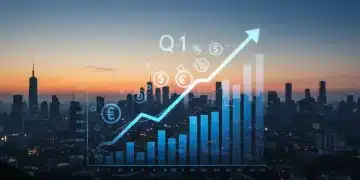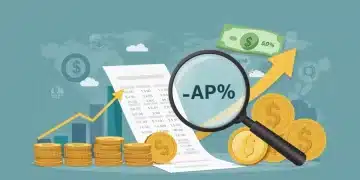Breaking news on global economic trends: what you need to know

Breaking news on global economic trends highlights key indicators like GDP, unemployment rates, and inflation, which influence consumer behavior and investment decisions in emerging markets.
Breaking news on global economic trends captures the attention of investors and the public alike. Understanding these shifts can be crucial to making informed financial decisions. Ready to dive in?
current global economic conditions
The current global economic conditions are a reflection of complex interactions between various factors, including policy decisions, market trends, and unexpected events. This combination creates a constantly shifting landscape that impacts everyone.
Key Factors Affecting the Economy
Understanding these factors can help us navigate the financial world better. Major contributors include:
- Inflation rates: Rising prices can erode purchasing power and affect consumer spending.
- Employment levels: High unemployment rates can indicate economic distress.
- Trade policies: Tariffs and agreements can significantly alter economic dynamics.
- Global events: Natural disasters and political unrest can disrupt trade and production.
Moreover, the impact of these elements isn’t always straightforward. For instance, while low unemployment might suggest a strong economy, it could also lead to wage inflation, which in turn can lead to higher costs for businesses and consumers alike.
The interplay between domestic and international factors further complicates this scenario. For example, economic slowdowns in major economies like China or the U.S. can have ripple effects worldwide, affecting export-driven industries in developing nations.
Current Trends
Presently, many economies are grappling with uncertainty due to a combination of inflationary pressures and supply chain disruptions. These issues have been exacerbated by recent global events, highlighting the need for countries to adapt quickly.
As we examine the global economic landscape, it’s essential to stay informed about the changing trends. Investors and consumers alike should pay close attention to reports and forecasts from reliable sources to better understand these conditions.
In conclusion, the current global economic conditions are shaped by a multitude of factors that require ongoing attention and analysis. Staying informed can provide insights into potential shifts and opportunities ahead.
impact of inflation on economies

The impact of inflation on economies is a critical aspect of economic health. Inflation can influence everything from employment rates to consumer behavior, making it essential to understand its effects.
How Inflation Affects Consumers
When inflation rises, consumers often face higher prices for everyday goods. This can lead to changes in spending habits. For instance, they might start buying less or opting for cheaper alternatives.
- Reduced purchasing power: As prices climb, the value of money decreases, making it harder for consumers to afford essentials.
- Shifts in preference: Consumers may choose different products or brands, seeking better deals.
- Increased savings: In anticipation of future price hikes, people may save more rather than spend.
Businesses also feel the strain of inflation. Higher costs for raw materials and labor can cut into profits. Some companies may pass these costs onto consumers by raising prices, while others may find ways to absorb them.
Inflation and Employment
Inflation doesn’t just affect prices; it also impacts job markets. During periods of high inflation, uncertainty can lead companies to hold off on hiring.
Moreover, wage growth may not keep pace with rising prices, leaving many workers feeling financially squeezed. Employers may face pressure to increase wages to keep their employees, which can contribute to further inflation if not managed carefully.
The relationship between inflation and economic growth is complex. While moderate inflation is sometimes seen as a sign of a growing economy, high inflation can lead to instability and dampen growth potential.
For policymakers, managing inflation is a juggling act. They must balance the need for economic growth with the dangers of letting inflation get out of control. Tools like interest rate adjustments can help, but they also come with their own set of consequences.
emerging markets to watch
Emerging markets are crucial for global economic growth, offering opportunities for investors and businesses. These countries are characterized by rapid growth and industrialization, presenting unique prospects and challenges.
Key Emerging Markets to Consider
Several emerging markets attract attention due to their potential. Each of these markets has distinct advantages:
- Brazil: Known for its diverse economy and vast natural resources, Brazil is a leading player in agriculture and energy.
- India: With a large population and a booming technology sector, India offers a growing consumer base and innovation.
- Vietnam: Emerging as a manufacturing hub, Vietnam benefits from foreign investment and trade agreements.
- South Africa: It serves as a gateway to the African continent, rich in minerals and diverse industries.
Investors are keen to watch these markets closely. Economic indicators such as GDP growth, inflation rates, and political stability can signal opportunities or risks. High growth rates can mean potential rewards, but also volatility.
Trends in Emerging Markets
As global technology evolves, many emerging markets are leveraging it to transform various sectors. For example, the rise of fintech companies in Africa is revolutionizing banking and finance.
Another significant trend is the push for sustainability. Emerging markets are increasingly focusing on renewable energy and sustainable practices, aligning with global shifts towards greener economies.
The political landscape also plays a vital role in shaping these markets. Government policies can either foster growth or create barriers, influencing investor confidence and market stability.
key indicators for future trends

Key indicators for future trends play a vital role in understanding where economies are headed. By analyzing these indicators, businesses and investors can make informed decisions to navigate upcoming challenges and opportunities.
Important Economic Indicators
Several economic indicators help forecast future trends:
- Gross Domestic Product (GDP): GDP measures the overall economic output of a country. An increasing GDP suggests growth, while a declining GDP can signal trouble.
- Unemployment Rate: A low unemployment rate typically indicates a healthy economy. However, rising unemployment can suggest economic distress.
- Consumer Price Index (CPI): CPI tracks inflation by measuring price changes in a basket of goods. High inflation can lead to decreased consumer spending.
- Interest Rates: Central banks set interest rates to control inflation. Changes in rates can influence borrowing and spending.
Monitoring these indicators can provide insights into potential shifts in the economy. For example, if the CPI rises sharply, it may lead to increased interest rates, which can slow down economic growth.
Market Sentiment
In addition to traditional economic indicators, market sentiment can also reveal much about future trends. This involves analyzing investor attitudes, which can drive decisions in the stock market.
Surveys and reports often gauge consumer and business confidence. High confidence typically correlates with spending and investment, while low confidence can lead to recessionary behavior.
Technological advancements and geopolitical events also shape these indicators. As countries innovate and adapt to global changes, understanding the implications of technological shifts becomes crucial for predicting economic outcomes.
FAQ – Frequently Asked Questions about Global Economic Trends
What are key indicators for predicting future economic trends?
Key indicators include GDP, unemployment rates, consumer price index, and market sentiment, which help gauge economic health.
Why should I pay attention to emerging markets?
Emerging markets like Brazil and India offer growth opportunities and can be key players in the global economy.
How does inflation affect consumers?
Inflation raises the cost of goods, which can lead to reduced purchasing power and changes in consumer spending habits.
What role does technology play in economic trends?
Technology drives innovation and efficiency, influencing growth in emerging markets and reshaping traditional industries.





